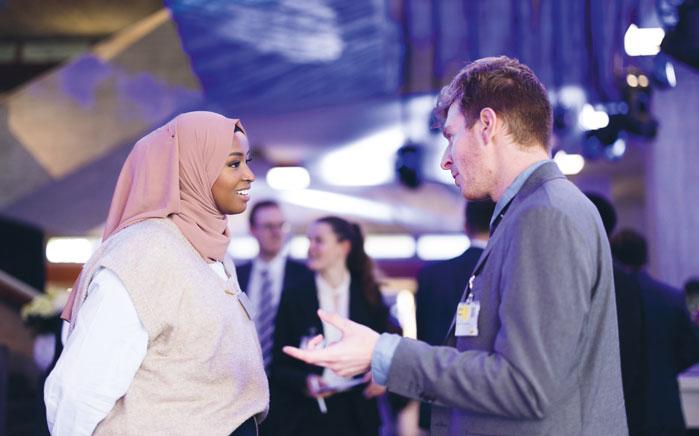
4 minute read
Dies academicus 2022
HSG Impact Awards
After two virtual celebrations, the traditional Dies academicus again took place on the campus of the University of St.Gallen on 21 May 2022. The celebration was attended by University members and guests from politics, academia and the general public.
Once a year, the academic celebratory day of the University of St.Gallen brings together friends and former students of HSG with personalities from academia, politics, business and the general public. This year’s Dies academicus was opened by Prof. Dr. Bernhard Ehrenzeller, President of the University of St.Gallen.
«St.Gallen, Thinking Hub»
“Universities provide diversity in unity; at the same time, they are part of a community of values. In addition, universities are places whose impact transcends their communities in the narrower sense of the word,” said President Bernhard Ehrenzeller. In SQUARE, in particular, HSG had created a space where teaching and learning were not only intended to be refashioned, but would also increasingly invite people to cross the bridge – towards the inside as well as towards the outside. Lately, the label “Sankt Denkplatz” – St.Gallen, Thinking Hub – was being displayed on HSG doors – and indeed, the city had been transformed into that with the arrival of the eponymous saint: a place of intellectual energy, a place of thought leadership. The approaching 125th anniversary of HSG should be a year of celebration, but equally a year of reflection on “the future of the university”, in whose discussion all of us were invited to participate, said President Bernhard Ehrenzeller to conclude his address. Brief video clips provided a retrospective of the HSG year of 2021 – 2022. With the return of campus life, activities also registered a strong increase at the beginning of Autumn Semester 2021. Highlights were the inauguration of SQUARE in mid-February 2022 and the launch of the Master’s programme in Computer Science in October 2021, a sustainability course and student project in the context of the National Model United Nations. The 50th anniversary of the introduction of women’s suffrage in Switzerland was also reviewed in the videos.
Lukas Zumbrunn acquainted the audience with his perspective on what would occupy HSG until 2062 – the year of his possible retirement. He emphasised three aspects: firstly, “The digital university is coming,” secondly, “Student involvement fosters their personal development” and thirdly, “Excellence, from the past into the future”.
The Student Union awarded the Mentor Prize to Dr. Felix Grisard, Chairman of the Board of Directors of HIAG and

Back on campus: Moving in for the Dies academicus 2022.
a member of the HSG Advisory Board, and a Teaching Award to Alexander Gruber, Ph.D.
Three Honorary Doctorates awarded, three new Honorary Senators
An honorary doctorate was awarded to three professors: • Professor Mike Burkart, Professor of
Corporate Governance and Financial
Contracting at the London School of
Economics and Political Science, was awarded an Honorary Doctorate by the
School of Finance (SoF-HSG) as an internationally significant researcher, particularly with trailblazing work on the influence of shareholder activism and corporate takeovers on a company’s value. • Professor Eileen Fischer, Professor at the
Schulich School of Business in Toronto, was awarded an Honorary Doctorate in
Economic Sciences by the School of
Management (SoM-HSG) as a leading academic and international voice in the field of qualitative consumer research. • Professor Silvana Tenreyro, Professor of
Monetary Policy and International
Economics at the London School of
Economics and Political Science and an external member of the Bank of
England’s Monetary Policy Committee, was awarded an Honorary Doctorate in Economic Sciences by the School of
Economics and Political Science (SEPS-HSG). The following people were received into the Honorary Senate: • The long-time Managing Director of the
Startfeld Foundation and the initiator of the educational lab Smartfeld, Dr.
Cornelia Gut-Villa was appointed an
Honorary Senator of HSG for her great services and commitment to the location of St.Gallen. • In Prof. Dr. Dr. Dr. h.c. Ann-Kristin
Achleitner and Dr. Paul Achleitner, the
University of St.Gallen receives two outstanding providers of impulses into the Honorary Senate. In 1994, Ann-
Kristin Achleitner was the first woman to be habilitated at HSG. Paul Achleitner obtained his doctorate from HSG in 1985. “Not only have you shaped institutions, but with your integrity and personal attention, you have been role models for many, particularly the young generation,” said President Bernhard
Ehrenzeller in his eulogy.
HSG Impact Awards for three projects
The HSG Impact Awards were also conferred on the occasion of the Dies academicus 2022. For the fifth time, the award went to HSG researchers who have made a particularly valuable contribution to society: to the research project “Ethik der Covid-19 Pandemie” (Ethics of the Covid-19 Pandemic) by Prof. Dr. Thomas Beschorner and Prof. Dr. Martin Kolmar, to the project “Life Design” by Prof. Dr. Sebastian Kernbach, Prof. Dr. Martin Eppler and Prof. Dr. Sabrina Bresciani, and to “Die Zukunft der Arbeit verantwortungsvoll gestalten: Implikationen aus dem Pioneering-Projekt Resilienz und Hochleistung @Hilti” (Responsibly Designing the Future of Work: Implications from the Pioneering Project Resilience and High Performance @Hilti) by Prof. Dr. Heike Bruch, Prof. Dr. Nils Fürstenberg and Frederik Hesse.
Award of the Latsis Prize
The International Latsis Foundation annually honours young researchers at selected Swiss universities. This year, the prize went to Dr. Jamie Gloor, Assistant Professor of Diversity and Leadership Science. Her focal research points include the future of work and executives, diversity, artificial intelligence, emotions and humour.
Second HSG Culture Prize 2022
This year, HSG honoured the Solidaritätshaus St.Gallen. This “Solidarity House,” or “Solihaus” for short, is an open house for refugees and migrants in the St.Gallen, Appenzell and Thurgauregion. It offers them a daily structure, help with various concerns, spare-time activities and courses free of charge. With various events, the Solihaus also enables personal encounters between refugees and the local population.







